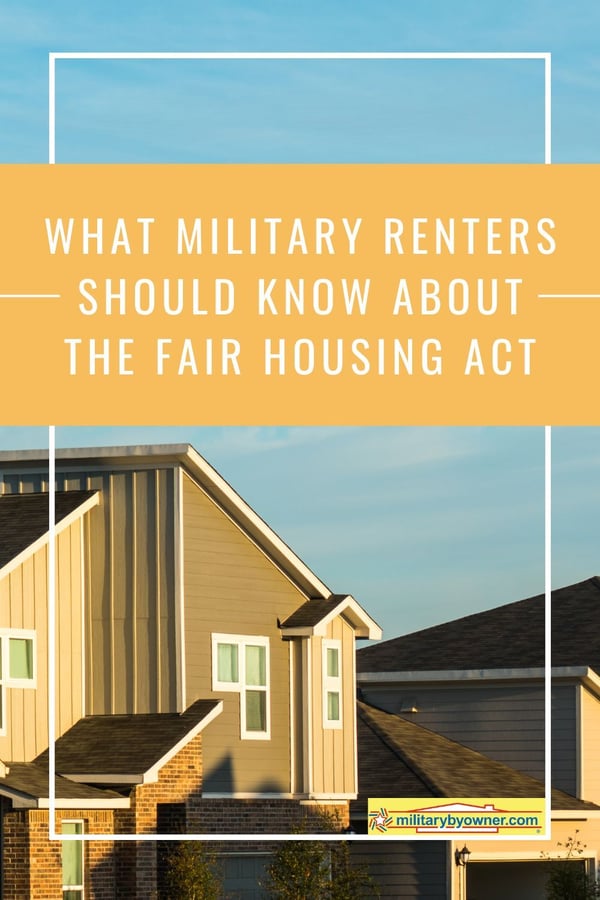4 Things Military Renters Should Know About the Fair Housing Act
It may have never occurred to you that as a military renter, you have tenant rights that are protected by the U.S. Department of Housing and Urban Development (HUD) and the Fair Housing Act (FHA). This unawareness usually stems from the good fortune that your landlords have been informed of the laws and have abided by the guidelines while operating their military rentals and maintaining proper property management.
But, if you've ever had a gut feeling that you’ve been singled out during house-hunting trips because, for example:
- The landlord's actions or words intimidated you from asking for accommodations for your disability
- Something felt "off" about how the owner handled the advertising and screening process for tenants
- The property management style struck you as unfair or discriminatory
- Tenants' rights, repairs, and maintenance inquiries were repeatedly ignored
.... then you might have encountered unlawful discrimination. The best way to combat any discrimination, unintentional or not, is to become knowledgeable about your rights as a renter under the Fair Housing Act.

1. What Is the Fair Housing Act?
Our article, What Homeowners and Landlords Should Understand About the Fair Housing Act explains,
"As part of the 1968 Civil Rights Act, the Fair Housing Act (FHA) was written to fight against the rampant racial segregation within collections of housing. In simple terms, the FHA forbids housing discrimination based on race, color, religion, national origin, sex, disability, and familial status. The initial 1968 legislation did not include protections for the qualifiers of sex, disability, or familial status. They were later added in 1974 and 1988, respectively.
Local governments may also insert protected classes of people into the federally protected group already established. It's common to see states or cities legislate discrimination against people with certain income levels, military history, marital status, sexual orientation, or gender identity."
2. Which Types of Housing Are Protected?
The HUD’s informational booklet, Fair Housing Equal Opportunity for All, states,
"The Department of Housing and Urban Development (HUD) enforces the Fair Housing Act, which prohibits discrimination and the intimidation of people in their homes, apartment buildings, and condominium developments—in nearly all housing transactions, including the rental and sale of housing and the provision of mortgage loans."
3. Common FHA Violations Military Renters May Encounter
Watch for these red flags during your military rentals search and during the process of a background check for renters. They could pop up and alert you to potential discrimination tactics.
Illegal Advertising and Marketing
Landlords can get tripped up when marketing toward what they perceive as their ideal renters. In writing, the owner cannot disqualify potential renters for reasons that seem obvious, such as race or sex, but other, more subtle rules, such as questions regarding familial status, are regularly violated.
Restrictions on the number of children (in relation to local laws regarding sleeping space and square footage) or future children are illegal. Language that mentions "kid-friendly" or "only older kids permitted" violates familial status. Owners and property managers also cannot create different rules for renters with children. For instance, quiet hours in an apartment apply to all tenants, regardless of age.
Changing Terms in the Rental Application Process
The rental process must be transparent, and each application must be subject to the same criteria. A landlord cannot ignore a background check for some renters or credit checks for certain classes of people, yet expect others to submit the information. Discriminatory verbal and written statements are also illegal. For example, the homeowner cannot lie about the property’s vacancy if they prefer not to rent to families with children.
 Photo by FatCamera from Getty Images Signature via Canva.com
Photo by FatCamera from Getty Images Signature via Canva.com
Refusal to Accommodate Disabilities
Landlords cannot refuse to rent to a person with a disability, either mental or physical. They also cannot ignore a request to accommodate the disability. A common situation includes a certified service dog. They are legally protected and must be allowed to live in the property, even if it is advertised as "No Pets."
However, if the disability is not apparent, the owner is within their rights to verify the connection between the requested accommodation and the disability.
4. What Steps Can You Take If You Suspect Renter Discrimination?
Even if your landlord is unresponsive to your concerns, you still have tenants' rights that must be addressed.
Property managers, homeowners, and landlords all operate their rental businesses under FHA mandates, which allow for litigation and expensive fines if an investigation into violations proves wrongdoing. These deterrents are beneficial to renters, but if, during your rental search, you suspect discriminatory practices and want to file a report, HUD asks for specific information.
- Name and address
- Name and address of the person against whom the complaint is filed
- Address and details of the housing involved
- A brief description of the situation in which you perceived discrimination
- Relevant dates
Complaints can be filed online, by mail, or by calling 1-800-669-9777. Each region of the country has a local office that processes the complaints. After receipt, HUD will notify you in writing of its decision to proceed and to investigate. They will also inform the alleged violator and allow time for the alleged violator to respond to the complaint.
During the investigation, HUD is required to offer the parties the chance to resolve the issue through a conciliation agreement. The agreement will provide a solution to your issue and allow the property owner to improve their discriminatory practices. After the parties agree, the investigation stops. Continued violations could be turned over to the Department of Justice.
Hopefully, throughout your repeated rental home searches over a military career, you’ll never encounter discriminatory practices. Maintaining awareness of your rights and your landlord's rights under the FHA is crucial for recognizing blatant discrimination. Chances are, any inadvertent discrimination you will face is connected to ignorance of the law and not intentional. With experience, you can identify the disconnect and discuss solutions with the property owner.





